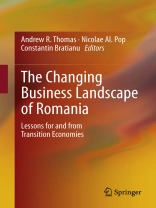Romania stands at the crossroads of Europe, Asia, and the Middle East. Since 1990, when the country experienced the bloodiest revolution of all of the Warsaw Pact members, Romania has gone through withering change. While the formal transition from a totalitarian, communist state was completed in 2007 with Romania’s accession into the European Union, the adaptation of the nation’s people and business climate to a market-based economy is a daily occurrence.
In the 2000’s, in the lead up to EU accession, Romania was one of the largest recipients of Foreign Direct Investment in the world. While multinational corporations poured in hundreds of billions of dollars, there was also a restructuring of the way business was conducted. Western systems of management and organization—foreign to most Romanian academics and business people—almost overnight transformed the way the marketplace was perceived.
Romania’s entrepreneurs were quick to adapt to the new ways, leveraging new opportunities in the environment. Fortunes were made. Multinationals also burgeoned in Romania. Companies like Microsoft, General Electric, Timken, Kraft, P&G, Renault and dozens of others successfully took advantage of the possibilities created by a relatively well-educated population that was moving into the middle class.
For the most part, however, researchers and scholars were caught off guard by the quickening pace of business change in Romania. Only until very recently has the academic community at large been able to wade through the murkiness and begin to see what the new landscape looks like.
It is the purpose of this edited volume, which includes the work of some of Romania’s finest business scholars, to provide even greater clarity to the current and future scene. Moreover, the experience in Romania helps shed light on the dynamics of economic and business transition throughout Eastern Europe, the Middle East, and other emerging regions, withimplications for practice, policymaking, and research.
İçerik tablosu
Introduction.- The Multi- field Structure of Organizational Knowledge.- Investigation of National Culture’s Impact on Competitiveness and Knowledge Sharing Competences.- Development of an Organic Food Mentality in Romania.- Euro Adoption in Romania.- Is Networking of People, Attitudes, and Ideas Exploitable for Marketing of New Energy Solutions?.- A Multi- agent System for Acquiring Transport Services.- Twenty Years After: Management and Performance Measurement in Romanian State- Owned Enterprises.- Factorial Analysis of the Correlation Between Competitive Strategy and Company’s Characteristics: The Case of the Romanian Business Environment.- Changes in the Romanian Consumer Behavior.- Green Clusters as New Cooperation Strategy for Cleantech Companies.- The Integrated Marketing Communication–The Consumer Behaviour Impact: A Romanian Impact.- The Romanian Labor Market for Young People.- Engaging Faculty and Students: A Premise for Excellence in Business Education at a Romanian Business School.- Using Fuzzy Models in Managerial Decision.- Antecedents and Consequences of Customer Retention and Loyalty Orientation in Romanian Telecommunications.












